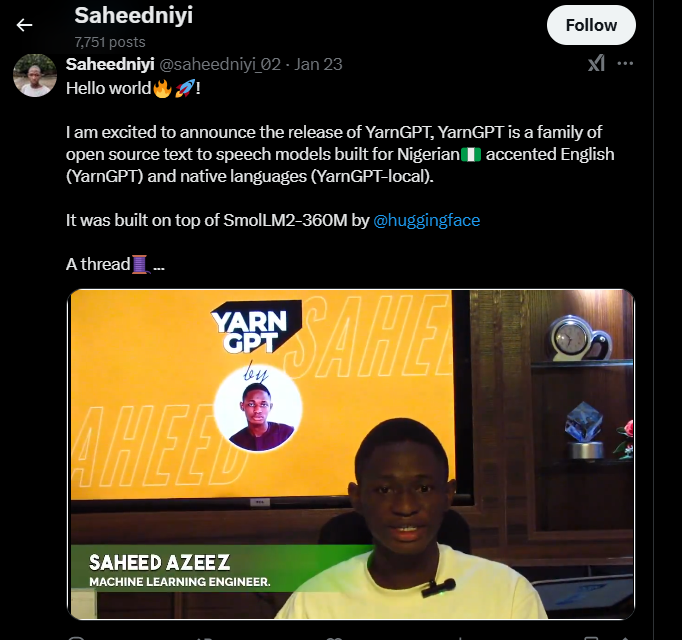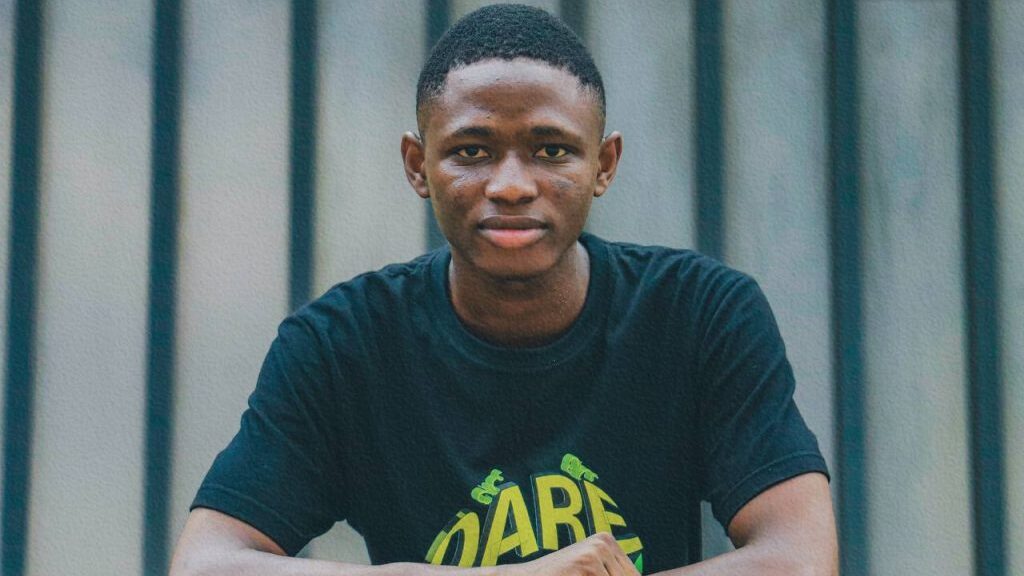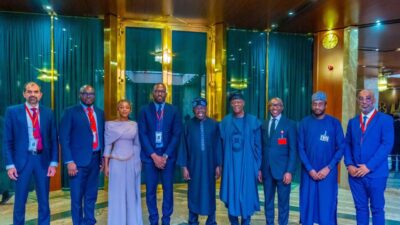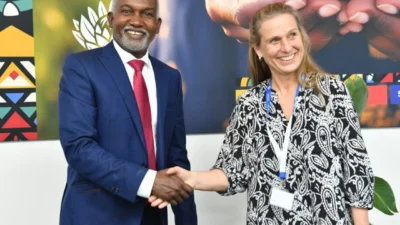Meet Azeez Saheed, a final-year Mechanical Engineering student at the University of Lagos. While studying engineering, Azeez developed a strong interest in machine learning and artificial intelligence (AI).
He taught himself Python programming and began creating AI projects that address challenges specific to Nigeria. Notably, he developed YarnGPT, an AI model designed for Nigerian languages, and Naijaweb, a dataset to improve access to Nigerian data.
In this interview, Azeez shares his journey, the obstacles he had faced, and his plans in the AI field.
A Journey from Mechanical Engineering to Machine Learning
Azeez Saheed’s journey into artificial intelligence (AI) and machine learning (ML) space is anything but conventional. Originally an undergraduate student of mechanical engineering at the University of Lagos, his curiosity and drive led him to explore the tech industry. Seeking skills that will give him an edge in his career, he joined the Developer Student Club (DSC Unilag), where he was introduced to Python programming.
“I’m a mechanical engineering undergraduate at the University of Lagos. When I gained admission, I wanted to learn skills that would give me an edge in my career, and that was how I joined a club in my school (DSC Unilag; Developer Student Club Unilag). I learned the basics of Python in that class. Then during the class, someone mentioned machine learning, and I thought machine learning was very related to mechanical engineering (because mechanical engineering deals with machines), and that was how I got into machine learning. During the COVID period in 2020, I was at home doing nothing, and that was what I spent a lot of my time doing.“
From Enthusiasm to Practical AI Solutions
Unlike many in the field who have a single defining moment that shapes their passion, Azeez describes his journey as a steady process. Some days were filled with excitement, while others were more challenging. However, seeing friends secure impressive jobs or encountering remarkable AI projects continually reignited his enthusiasm.
“Okay, so I don’t think there’s like a special pivotal moment for me. I think basically it’s just the way your normal life is, some days you are enthusiastic about it, some days you are not so excited. So I can’t really say there’s one pivotal moment or project. But another thing that motivates me to do more is when I see a friend of mine getting a good job, or I see an amazing ML/AI project, and it makes me excited about the ML/AI space.“
His first tech job, which he secured in the past year, was a pivotal learning experience. It gave him a deeper understanding of teamwork, business perspectives in AI, and the real-world applications of ML.
“In terms of my first tech job, I actually got my first tech job last year. So how has it shaped my career? I think it’s made me understand what it means to work in a team, how working under someone is, and how to see things from a business perspective.“
Innovating AI for Nigerian Languages: YarnGPT and YarnGPT-Local

Azeez is best known for his work on YarnGPT and YarnGPT-Local, AI models designed to process Nigerian languages. His motivation for building these models stemmed from a practical perspective; working on problems he understood best. Nigeria, with its diverse linguistic heritage, posed a unique challenge in the AI space, and Azeez saw an opportunity to bridge this gap.
“What inspired me to build models specifically for Nigerian languages? I think it’s because those are the projects/problems that are in front of me. They are easier to tackle because I understand those problems better.“
Developing YarnGPT was not without challenges. The primary obstacle was the lack of sufficient text-to-speech (TTS) data in Nigerian languages. Unlike English, where large datasets are readily available, Nigerian languages lacked the robust data needed for effective AI training. To overcome this, Azeez had to create his own datasets. Additionally, computational power posed a significant hurdle, as training AI models required expensive GPUs. He addressed this challenge by using personal savings to fund cloud-based GPU services.
“In terms of challenges I faced, I think the major challenge in building any model for a Nigerian use case is data. Data is very hard to find, especially from a Nigerian standpoint. There wasn’t as much text-to-speech data as I would have loved, so I had to find ways to create my own text-to-speech dataset. Another challenge was computing power. I needed to pay for a GPU to train the model, so finance was more of an issue. But I was able to resolve that by dipping into some of my savings.“
Expanding AI Accessibility: The NaijaWeb Dataset
In a bid to make Nigerian AI data more accessible, Azeez developed the NaijaWeb dataset. His vision for this dataset is to empower developers to build AI models tailored for Nigerian use cases. He also hopes to dedicate some of his free time to expanding and refining the dataset, potentially unlocking even more applications in the future.
“Okay, in terms of potential applications for this dataset, I want people to build a model on top of this dataset. Maybe in my free time, I’m just going to build some reasonable models using the dataset and also work on a bigger dataset.“
Open-Source Contributions and Community Impact
A strong advocate for open-source AI, Azeez credits much of his own learning to the open-source community. For him, contributing back is both a duty and a passion. By making his work publicly available, he not only allows others to build upon it but also benefits from feedback that helps improve his projects.
“One of the things that motivates me to share my work openly is because I actually learn from open source. A lot of what I do is actually a buildup on top of what other people have done in the open-source space, so I just find it as a way of contributing back.“
“Since I learn from open source platforms it’s only makes sense for me to also give out my own addition back to the world that’s really one of my motivation because when you build project and another person’s build project be on top of your project, the project as a whole gets better and that has contributed to the growth of AI technology in General. Another reason is feedback, making my projects open source helps me in getting feedback from people.“
When asked how collaborating with platforms like Hugging Face and other open-source communities has impacted his projects, he explained that it has expanded the visibility of his work, allowing a wider audience to engage with his projects. He encourages aspiring developers to contribute to open-source by building unique projects rather than simply replicating existing ones. Innovation, he believes, comes from adding a distinct perspective to existing solutions.
“I won’t call it a collaboration because I’m actually a user of those platforms. But I think it probably gives my project a lot of audience. For example, the fact that it is on Hugging Face means a lot more people on those platforms can have access and see my project.“
His advice to aspiring developers looking to contribute to open-source projects is to focus on working on something unique. Rather than replicating existing projects, he encourages adding a personal touch and offering new value. He suggests adapting solutions from other countries to fit local contexts, creating something that addresses specific needs.
“An advice I can give is just try to work on something unique, that’s like the major advice. There’s no need to reinvent the wheel (do a project that a lot of people have done). You will learn from those projects, but you should try to add your own unique touch to every project you do. Don’t just copy and paste what somebody has done, but add something new to it. You can bring the solution that has been built for another country and build it around our own country and our context.”
The Challenges of AI Adoption in Nigeria

Nigeria is lagging in large language model adoption, and Azeez identifies several key barriers, and how can they be addressed. Beyond technological challenges, he emphasizes economic and educational hurdles. With widespread poverty, AI development is not always a priority, as more pressing socio-economic issues take precedence. Furthermore, the lack of AI models that understand Nigerian culture and languages makes adoption less attractive. He believes that improving education and cultural representation in AI will be critical for broader adoption in the country.
“In terms of Nigeria lagging behind the language window adoption I think the major issue for me is our major problems are actually beyond technology, for example, poverty. We are generally a poor country and “Na person wey don chop go dey think of Large language model”. Another thing that can be addressed to solve this problem is education. And also if these models are very good in terms of our cultural contexts and languages, they will be adopted.“
Overcoming Computing Power Limitations
A recurring issue in AI development is access to computing power. Azeez tackles this by using cloud-based services like Google Colab, which provide access to GPUs for model training. However, the cost of these services remains a significant constraint. He envisions a future where Nigerian AI researchers have access to free or subsidized GPU resources, which would dramatically accelerate innovation in the field.
“Personally, I navigate this challenge by paying for cloud services to use powerful GPUs (Google Colab) for computing power to train models. What will make the biggest difference for me is maybe a platform where I can access GPUs for free.“
Choosing Tools and Techniques for Machine Learning Projects
His approach to deciding which tools and techniques to use for different projects involves relying heavily on Python, as he is a Python developer.
“In terms of tools to use for a project, I am a Python developer, so I use only Python personally. Whatever project I’m doing, I try to do everything with Python. If it’s something I can’t do with Python, I partner with a friend. In terms of tools and techniques, I do a Google search at first to see what people have done around the project I’m working on before jumping into it. Yes, I do a Google search, then I look at the available results and check which is easier to implement and which is faster, and more efficient to determine the techniques to use.“
Cultural Representation in AI Development
He emphasized that cultural representation is crucial in AI development. Integrating Nigerian culture into AI models ensures that they understand local perspectives and can be used to address specific challenges within the country.
“Cultural representation is very important. If you are using a model that wasn’t trained on Nigerian data for a Nigerian use case, the model might not work perfectly. So it’s very important for us to have our own culture integrated into those models so those models understand things from a Nigerian perspective and can be used to solve our own problems.“
Challenges faced, Success Stories, and Lessons Learned
Among his many projects, one of Azeez’s most rewarding endeavors was the creation of a Twitter bot called @_screenshoter in 2022. This bot, which automatically took screenshots of tweets, quickly gained popularity, amassing 175,000 followers. While he eventually sold it, the experience was a turning point in his career, both financially and professionally.
“Okay, so in 2022, I worked on developing a Twitter bot called @_screenshoter. It’s basically a bot that helps screenshot tweets, and I even coded most of it on my phone. When I put it out, it actually went viral, it had about 175k followers on Twitter at some point. I eventually sold the bot to someone, and maybe not for as much money as I would have loved, but actually, that was my most rewarding project because the money I sold it for was plenty for my financial status at that time.”
However, not all projects have been smooth sailing. Some have faced unexpected roadblocks, and in many cases, Azeez has had to abandon or pause them. Yet, these setbacks have only strengthened his problem-solving skills. Every failed project provides new insights, allowing him to anticipate potential issues in future work.
“Okay, a lot of the projects I work on don’t go as planned. So if they don’t work as well, I mostly abandon them or I take a break from them and come back to do them later when I’m refreshed. So what I’ve learned from those instances is I get better when working on a new project. I know of some possible issues that might cause failure, and I try to think early about those issues in my planning phase.“
He has competed in hackathons and ML competitions and His most valuable takeaway from these is learning how to build high-performing models.
“My most valuable takeaway is really on how to build high performing models. I think I know some simple tricks to increase the performance of a model which I wouldn’t know ordinarily.“
When asked to describe his tech journey in one word, Azeez chose “rewarding.” He explained that looking back on how he started and where he is today, his journey has been fulfilling, and he sees it as just the beginning.
Advice for Aspiring AI Engineers

For those looking to enter the AI and ML space, Azeez emphasizes the importance of mastering Python.
“Okay, so for someone starting in machine learning, I think just learn Python and learn Python libraries that relate to machine learning, that’s really the learning path to follow.“
Additionally, he suggests finding innovative ways to gather datasets and leveraging existing resources when computing power is limited.
“Currently, the way I tackle my computing power problem is I try to pay for cloud services online, and I try to make my code as efficient as possible just to run faster. In terms of datasets, the major options are to create your dataset from scratch. If this is difficult, you can use an existing dataset for another country and maybe use it as a starting point for your own project, and you can then gather more data later.“
One of the biggest challenges newcomers face is impostor syndrome. His advice? Keep building projects. Seeing tangible results and receiving feedback from the community can be a powerful confidence booster. The key to persistence is to continuously learn, experiment, and refine one’s skills.
“The advice for overcoming impostor syndrome is just keep building projects. When you build an amazing project and show it to people and they give you feedback, you get better, and you can easily look back at that project and say, ‘Oh, I did this, why am I having impostor syndrome?’ You just have to keep giving yourself reasons or motivation to continue.“
The Future of AI in Nigeria
Looking ahead, Azeez envisions a future where AI is deeply integrated into Nigeria’s industries, solving local problems with culturally relevant models. Despite having a great idea, the success of a machine learning project largely depends on having the right data to solve the problem.
“One thing I wish people knew better about machine learning is that machine learning requires data. So if you are giving somebody a project to do, you need to ensure that there’s data needed to build that model or system. Machine learning isn’t magic, you need high-quality data to solve most machine learning problems and that ‘great machine learning idea in your head.“
While his Llama3-8B-Naija_V1 project is currently on hold, he hopes to revisit it with better datasets and more refined models.
“Okay, so the model Llama3-8b-Naija_V1 is currently abandoned, actually. What’s next? I think I will get a better dataset and train a better model in the future in my free time.”
He mentioned that while he doesn’t have a specific innovation in mind for the future, his main focus is on solving problems and building solutions. He expressed a strong interest in continuing to work within the AI space, and believes that the future will guide his direction in terms of innovations and collaborations.
“Okay, so currently I really don’t know what the future holds. Really, I’m just interested in solving problems and building solutions. I don’t have any specific innovation, but I know I want to keep solving problems in the AI space, and the future will decide that, really.”
Given unlimited computing resources, his dream project would be the development of a multimodal AI model capable of processing text, images, audio, and video to address African-specific challenges.
“If I have unlimited resources and computing power, I’ll train a multimodal (text, images, audio, and even video) language model to solve African problems.“
Saheed’s Tech Icon
If Saheed could meet any AI/ML pioneer or tech visionary, He would choose Elon Musk, citing his significant role in tech history and expressing a desire to have a conversation with him.
Final Thoughts
Saheed’s story highlights the impact of passion, learning, and persistence in technology. His story is an inspiration for young Nigerians looking to make an impact in tech. Starting with self-taught programming skills, he has created AI solutions that reflect Nigeria’s unique languages and culture.
His commitment to open-source projects and community involvement not only drives technological progress but also motivates others to use AI for social good. If you’re interested in AI, now is the time to start learning, building, and contributing, just like Azeez did.
To explore Azeez’s projects and stay updated on his work, you can follow him on LinkedIn and Twitter.




